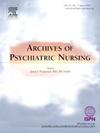Educating staff on physical activity promotion in secure psychiatric care: the development of a self-determination theory informed intervention
IF 2.2
4区 医学
Q1 NURSING
引用次数: 0
Abstract
Background
Healthcare assistants (HCAs) are well placed to promote physical activity (PA) in secure hospitals, though multiple barriers limit these opportunities. Using a Medical Research Council (MRC) commissioned framework, this study aimed to develop a self-determination theory (SDT) informed e-learning module for HCA's.
Methods
The development process included three phases. (1) a preparatory phase involved a scoping review, immersive fieldwork and 15 patient interviews. (2), a development phase involved establishing an intervention development team, selecting appropriate theory (SDT) and collecting pilot data (3) a user testing phase exploring intervention acceptability through a staff survey.
Results
The outputs from each phase informed the production of an e-learning educational module. The first section of the module incorporated information on: the importance of PA and consequences of prolonged inactivity in inpatient settings, benefits of PA in secure settings and the role of ward staff in PA promotion. The second section, underpinned by the tenets of SDT, outlined the three basic needs, highlighted the importance of these needs in motivating behaviour change and provided specific practical examples of how HCAs can adopt need supportive behaviours. The final section provided interactive case studies where HCAs identified strategies to meet patients individualised needs regarding PA engagement. Following preliminary testing, 71 % of staff reported changing PA promotion practices after the training.
Conclusions
Following MRC guidelines on the development phase of an intervention allowed for exploration of both population and environmental considerations and provided a strategy to develop an intervention that can be integrated into routine care.
在安全的精神科护理中对工作人员进行促进身体活动的教育:自我决定理论知情干预的发展
背景:在安全的医院里,医疗保健助理(hca)在促进身体活动(PA)方面处于有利地位,尽管多重障碍限制了这些机会。利用医学研究委员会(MRC)委托的框架,本研究旨在为HCA开发一个自决理论(SDT)的电子学习模块。方法研制过程分为三个阶段。准备阶段包括范围审查、沉浸式实地考察和15名患者访谈。(2)开发阶段,建立干预措施开发团队,选择合适的理论(SDT),收集试点数据;(3)用户测试阶段,通过员工调查探索干预措施的可接受性。结果每个阶段的产出为电子学习教育模块的制作提供了信息。该模块的第一部分包含了以下信息:PA的重要性和住院环境中长期不活动的后果,PA在安全环境中的好处以及病房工作人员在PA推广中的作用。第二部分以SDT的原则为基础,概述了三个基本需求,强调了这些需求在激励行为改变方面的重要性,并提供了hca如何采用需求支持行为的具体实际例子。最后一部分提供了交互式案例研究,其中HCAs确定了满足患者在PA参与方面个性化需求的策略。经过初步测试,71%的员工报告在培训后改变了个人助理的晋升方式。遵循MRC关于干预措施发展阶段的指导方针,可以探索人口和环境因素,并提供了开发可纳入常规护理的干预措施的策略。
本文章由计算机程序翻译,如有差异,请以英文原文为准。
求助全文
约1分钟内获得全文
求助全文
来源期刊
CiteScore
3.70
自引率
0.00%
发文量
131
审稿时长
160 days
期刊介绍:
Archives of Psychiatric Nursing disseminates original, peer-reviewed research that is of interest to psychiatric and mental health care nurses. The field is considered in its broadest perspective, including theory, practice and research applications related to all ages, special populations, settings, and interdisciplinary collaborations in both the public and private sectors. Through critical study, expositions, and review of practice, Archives of Psychiatric Nursing is a medium for clinical scholarship to provide theoretical linkages among diverse areas of practice.

 求助内容:
求助内容: 应助结果提醒方式:
应助结果提醒方式:


